Part 36: February 18 Broadcast

You are listening to BBC radio 4. In an hour, we’ll be talking about the soviets; Their history and their traditions. For the next hour, Professor David Stephenson will be presenting a documentary on the second 80 years war of the eighteenth century. This series will be running every third day, up to 50 episodes. If you want news of the current war in the Middle East please channel in to BBC radio 1.
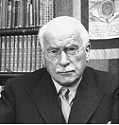 Good evening, and welcome to BBC radio 4. I’m Professor David Stephenson, professor of Dutch historical studies at Cambridge. This is the thirty-sixth part of our 50 episode special on the second 80 years war over Europe. Joining me for these broadcasts are fellow researchers and scholars Doctor Albert Andrews, specialist in German studies from the Berlin academy, Professor Robert Lowe, specialist in French studies at Cambridge, and a graduate student and technical assistant, Anton Thatcher. Last episode, we discussed the Dutch election and 1758, coming directly in the heels of the ceasefire with the British.
Good evening, and welcome to BBC radio 4. I’m Professor David Stephenson, professor of Dutch historical studies at Cambridge. This is the thirty-sixth part of our 50 episode special on the second 80 years war over Europe. Joining me for these broadcasts are fellow researchers and scholars Doctor Albert Andrews, specialist in German studies from the Berlin academy, Professor Robert Lowe, specialist in French studies at Cambridge, and a graduate student and technical assistant, Anton Thatcher. Last episode, we discussed the Dutch election and 1758, coming directly in the heels of the ceasefire with the British. At this point in time, the Western Atlantic Federation was the largest empire in recorded history, containing nearly forty percent of the world’s population. Every day they were growing stronger, no longer limited by the limitations of a wartime economy. As their network of roads advanced, people from across the empire who had previously stayed near home either to help train with the militia, remain safe where the army could not patrol the interior provinces, as they were pushed to the front, or were too busy casting bullets in homemade moulds for loved ones to drill loading and firing with began to journey abroad. People of France crossed borders constantly with those of Austria, those from Austria visited Spain, and visitors from all across the empire visited Amsterdam. While this sort of luxurious pilgrimage was confined to the rich and powerful, it was the sort of distraction they wanted after having spent decades in their cities to avoid any potential unpleasantries.
At this point in time, the Western Atlantic Federation was the largest empire in recorded history, containing nearly forty percent of the world’s population. Every day they were growing stronger, no longer limited by the limitations of a wartime economy. As their network of roads advanced, people from across the empire who had previously stayed near home either to help train with the militia, remain safe where the army could not patrol the interior provinces, as they were pushed to the front, or were too busy casting bullets in homemade moulds for loved ones to drill loading and firing with began to journey abroad. People of France crossed borders constantly with those of Austria, those from Austria visited Spain, and visitors from all across the empire visited Amsterdam. While this sort of luxurious pilgrimage was confined to the rich and powerful, it was the sort of distraction they wanted after having spent decades in their cities to avoid any potential unpleasantries.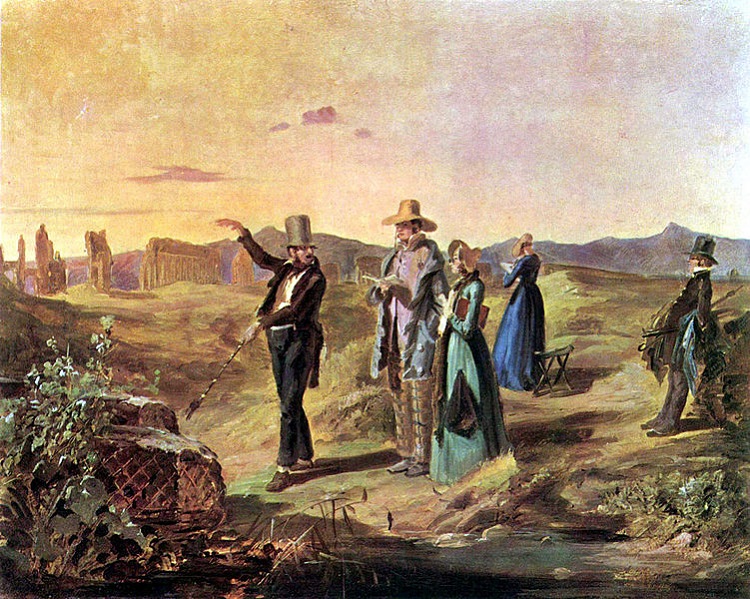
Tourism as we know it was far more prevalent by the 1800s. In the 1700s, travelers went abroad to meet with friends, family, business acquiescences or to go on pilgrimages.
 The Federation would grow even stronger. In 1760, the Ottoman Empire, a long time trade partner, and firm political friend to the Western Atlantic Federation had come forth with a request to join the Federation. If they joined, the Western Atlantic Federation would officially be more powerful than every other European state combined. A prospect that terrified the Polish and Russians, who prior were capable of defeating either the Dutch or the Ottomans with their combined might.
The Federation would grow even stronger. In 1760, the Ottoman Empire, a long time trade partner, and firm political friend to the Western Atlantic Federation had come forth with a request to join the Federation. If they joined, the Western Atlantic Federation would officially be more powerful than every other European state combined. A prospect that terrified the Polish and Russians, who prior were capable of defeating either the Dutch or the Ottomans with their combined might.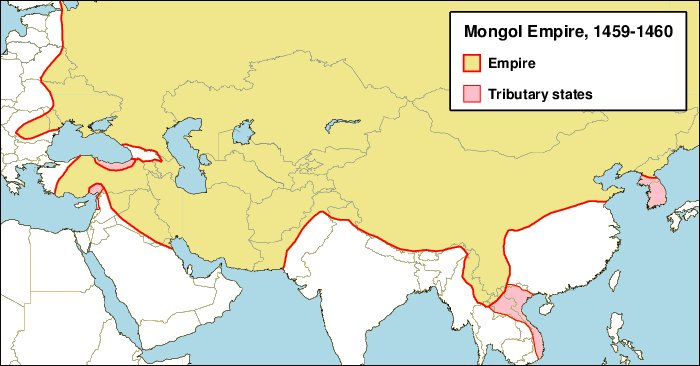
The world's largest Empire prior to the Dutch Empire was the Mongolian Empire. The Dutch Empire, including allies which were considered to be within the Empire were twice the size of Mongolian Empire at their height.
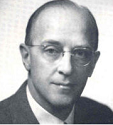 There was another political roadblock that prevented a quick Dutch agreement to an alliance. The Ottoman Empire was of the Islamic faith, and had long been an enemy of the Christians. An alliance with such people would invariably be seen as folly by the entire catholic population within the Federation, and it would be considered tasteless even to the protestants of the Dutch Empire. The Vatican, which had been encircled by the fall of Rome, and had taken a seat after being conquered had lobbied primarily that the Western Atlantic Federation had been given its strength by God to conquer the infidels in a new holy war. The Pope and his supporters had been calling for a crusade for years by 1760, but had been entirely shut down by more economically minded men.
There was another political roadblock that prevented a quick Dutch agreement to an alliance. The Ottoman Empire was of the Islamic faith, and had long been an enemy of the Christians. An alliance with such people would invariably be seen as folly by the entire catholic population within the Federation, and it would be considered tasteless even to the protestants of the Dutch Empire. The Vatican, which had been encircled by the fall of Rome, and had taken a seat after being conquered had lobbied primarily that the Western Atlantic Federation had been given its strength by God to conquer the infidels in a new holy war. The Pope and his supporters had been calling for a crusade for years by 1760, but had been entirely shut down by more economically minded men.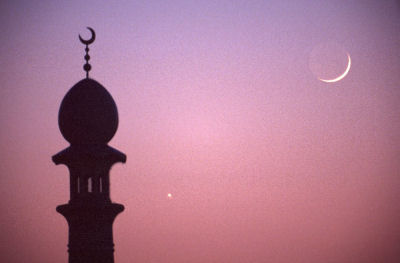
Islam at its most fundamental level was very similar to Judeo-Christian faith, and was derived from Christianity but the two had been at blows for centuries.
 But while the Dutch could easily get away with using the Ottoman Empire for their own economic benefit, they could far less easily justify becoming firm allies to the religiously devout among the populace. The question then was, to what degree would this action anger the populace?
But while the Dutch could easily get away with using the Ottoman Empire for their own economic benefit, they could far less easily justify becoming firm allies to the religiously devout among the populace. The question then was, to what degree would this action anger the populace?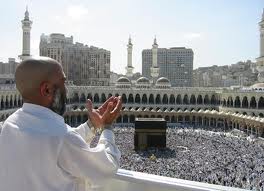
Islam seemed strange and foreign to the Christian populace, and had been considered a heretical interpretation of God and his will for centuries.
 By 1760, the power of the church had diminished significantly. The Vatican, formerly a world power that could sway the opinion of millions had been essentially suppressed. Towns once famous for their iconic churches had been smothered in industry and filled with smoke, blackening the once pristine stone, and making that which once represented purity into something dirty. Theologians had spent over three decades justifying hard work for the purpose of material wealth in God’s eyes, and more to the point, legitimizing Dutch rule. Despite this however, Atheism had not yet come into the popular public image, and while the philosophy of secular humanism had become popular to some, many more were vocal theists.
By 1760, the power of the church had diminished significantly. The Vatican, formerly a world power that could sway the opinion of millions had been essentially suppressed. Towns once famous for their iconic churches had been smothered in industry and filled with smoke, blackening the once pristine stone, and making that which once represented purity into something dirty. Theologians had spent over three decades justifying hard work for the purpose of material wealth in God’s eyes, and more to the point, legitimizing Dutch rule. Despite this however, Atheism had not yet come into the popular public image, and while the philosophy of secular humanism had become popular to some, many more were vocal theists.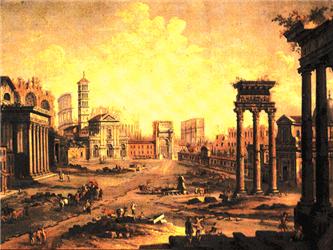
Some decried the capture of the Vatican as the fall of Christianity, but in truth, the Vatican had been sacked by protestant forces under Charles V prior. The Vatican has survived as a center of Christianity to this day.
 This had meant that while a large minority of the population would not have cared either way what population the Ottoman Empire followed so long as the agreement was lucrative, many good Christians still opposed the idea of an alliance with the heathens.
This had meant that while a large minority of the population would not have cared either way what population the Ottoman Empire followed so long as the agreement was lucrative, many good Christians still opposed the idea of an alliance with the heathens.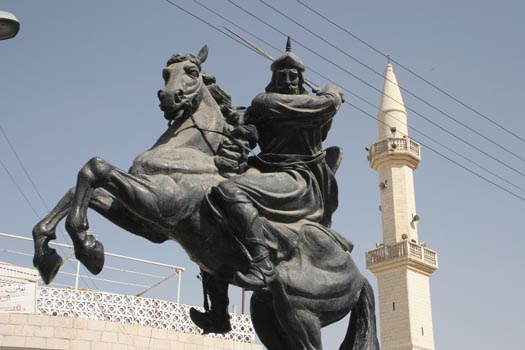
In truth, much of the ideological hatred towards the Islamic faith was not due to heresy, but because the Muslims had captured many of the lands considered holy to Christianity along with a great deal of wealth which could be found in those cities. During the time of the crusades, fought to retake or hold the holy lands, a great degree of propaganda was created about the Eastern threat which has persisted in the minds of Europeans for centuries.
 Ignoring the religions aspect many politicians were also opposed to the inclusion of the Ottoman Empire in the Western Atlantic Federation. While they had not made any particular demands for particular powers or rights within the Federation, the Ottoman Empire was second only to the combined Western Atlantic Federation in power. This meant that they were vastly greater than any constituent state, including the influence of the United Provinces.
Ignoring the religions aspect many politicians were also opposed to the inclusion of the Ottoman Empire in the Western Atlantic Federation. While they had not made any particular demands for particular powers or rights within the Federation, the Ottoman Empire was second only to the combined Western Atlantic Federation in power. This meant that they were vastly greater than any constituent state, including the influence of the United Provinces. And unlike other constituent nations, the Dutch had no means to abolish the Ottoman government and install politicians as they desired. With a powerful nation like France, the Dutch had overthrown the monarchy, established a series of essentially identical candidates to be voted for in political parties set up and more importantly, financed by the Dutch to control the populace. In the case of Hannover and Portugal, they were minor nations and kingdoms, so much so that the Dutch were willing to allow a small degree of influence from their respective monarchies, but as those nations represented such a small fraction of the Dutch Empire, their voice was minimal.
And unlike other constituent nations, the Dutch had no means to abolish the Ottoman government and install politicians as they desired. With a powerful nation like France, the Dutch had overthrown the monarchy, established a series of essentially identical candidates to be voted for in political parties set up and more importantly, financed by the Dutch to control the populace. In the case of Hannover and Portugal, they were minor nations and kingdoms, so much so that the Dutch were willing to allow a small degree of influence from their respective monarchies, but as those nations represented such a small fraction of the Dutch Empire, their voice was minimal.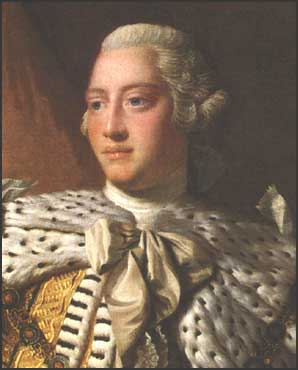
King George the third was supposed to be the rightful king of Hanover, but as England and Hanover were at war, William the fifth, descendant of William of Orange became their king. This gave considerable Dutch influence over Hanover.
 This wasn’t so with the Ottomans. If they pulled for special treatment or resources, the Dutch would have no means to gainsay them. Of course, from the Ottoman side, if the costs of maintaining the alliance to the Dutch had become too high, they would face a “civil war” between the states within the Western Atlantic Federation.
This wasn’t so with the Ottomans. If they pulled for special treatment or resources, the Dutch would have no means to gainsay them. Of course, from the Ottoman side, if the costs of maintaining the alliance to the Dutch had become too high, they would face a “civil war” between the states within the Western Atlantic Federation.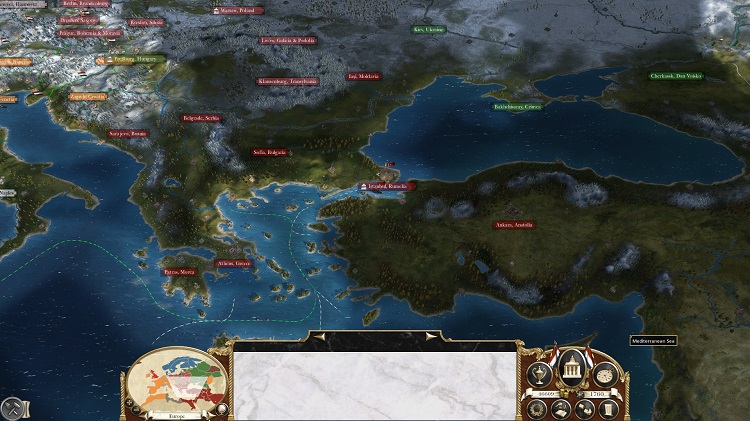
The Ottomans controlled a vast amount of land, some of which presented a path of invasion into Dutch lands.
 To fully consider this however, one needed to look at the Ottoman Empire itself. Not all of their own broad empire, which emulated the conquests of Alexander the Great, were supporters of the regime, and some states would have vastly preferred Dutch rule. When considering this, they were significantly weaker, and so long as the Dutch could guarantee the independent voices of the Ottoman Empire’s constituent parts, the influence could have been diminished.
To fully consider this however, one needed to look at the Ottoman Empire itself. Not all of their own broad empire, which emulated the conquests of Alexander the Great, were supporters of the regime, and some states would have vastly preferred Dutch rule. When considering this, they were significantly weaker, and so long as the Dutch could guarantee the independent voices of the Ottoman Empire’s constituent parts, the influence could have been diminished.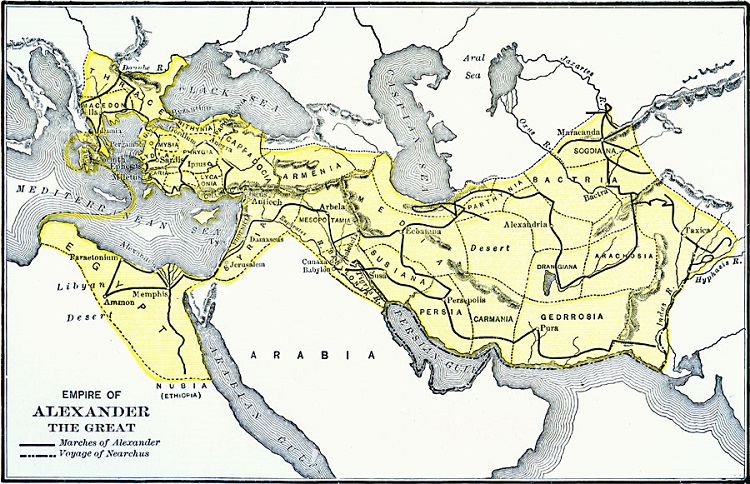
The Empire of Alexander the great, now in the hands of the Syrians and Parthians that he fought against in his great conquest.
 Their capital, Istanbul was formerly the capital Constantinople of the former Byzantine Empire, or Eastern Roman empire. They were the approximate equivalent of the now conquered Austrian Empire represented by the Hapsburg Empire. Compared to the Western Roman Empire, the Eastern Orthodox Church had been much more similar to the old Roman Empire. However, on their Eastern front, to Jerusalem and the crusader lands, the Turks had constantly attacked them, their holdings and their strongholds, pushing the Byzantines back to their fortress of Constantinople itself.
Their capital, Istanbul was formerly the capital Constantinople of the former Byzantine Empire, or Eastern Roman empire. They were the approximate equivalent of the now conquered Austrian Empire represented by the Hapsburg Empire. Compared to the Western Roman Empire, the Eastern Orthodox Church had been much more similar to the old Roman Empire. However, on their Eastern front, to Jerusalem and the crusader lands, the Turks had constantly attacked them, their holdings and their strongholds, pushing the Byzantines back to their fortress of Constantinople itself.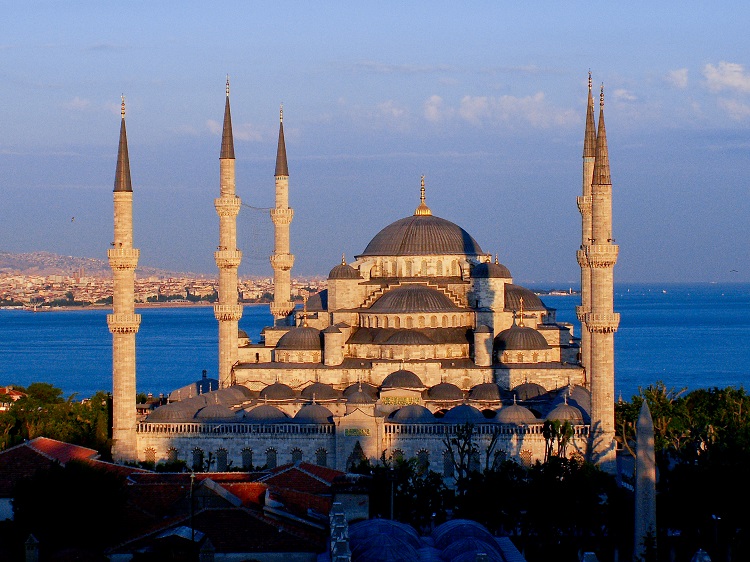
Istanbul had been a bastion of the Christian faith for hundreds of years. Many of the holy places were kept intact, merely re-purposed for the Islamic faith.[/i]
 While Constantinople had held countless assaults, their walls were finally breached in 1453, marking the end of the Eastern Roman Empire. With the great walls and the city sacked, Greece had become vulnerable to the Turkish invaders, and were also conquered. Stretching from the as far East as Afghanistan, and as far West as Greece, the Ottomans ruled over and had subjugated a vast swath of peoples who were very staunchly Christian. While neither Catholic or Protestant, these men wished greatly to be freed from Ottoman rule, and would likely side with the Dutch if a civil war broke out.
While Constantinople had held countless assaults, their walls were finally breached in 1453, marking the end of the Eastern Roman Empire. With the great walls and the city sacked, Greece had become vulnerable to the Turkish invaders, and were also conquered. Stretching from the as far East as Afghanistan, and as far West as Greece, the Ottomans ruled over and had subjugated a vast swath of peoples who were very staunchly Christian. While neither Catholic or Protestant, these men wished greatly to be freed from Ottoman rule, and would likely side with the Dutch if a civil war broke out.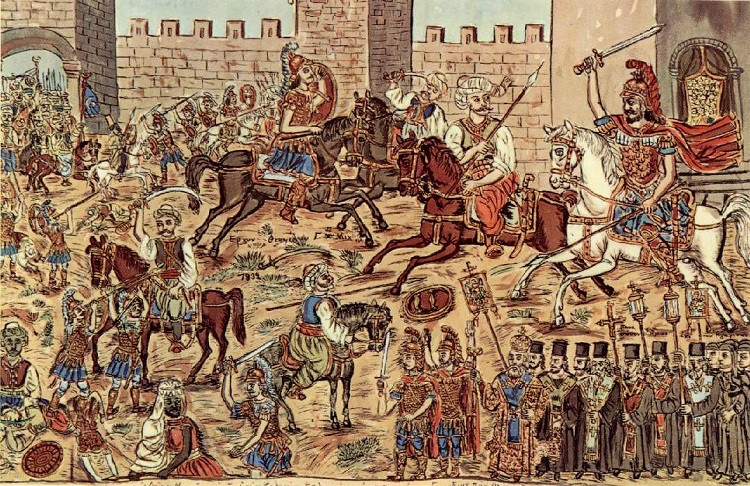
The Emperor Constantine allegedly died bravely defending the city to the last. Mehmed the third conquered Constantinople with massive cannons which helped them defeat the legendary walls, but even so, the Byzantines held the city for over a month.
 East of Istanbul in cities such as Damascus, the Islamic rule was very nearly absolute. While they had a long history of civil war during the time of the crusades, in modern times, their government had largely unified. This meant if a war did break out, it certainly would be a crusade of the modern era, fought largely over Greek lands, and over Hungary which was at war the Ottomans and had been pushed back to their capital.
East of Istanbul in cities such as Damascus, the Islamic rule was very nearly absolute. While they had a long history of civil war during the time of the crusades, in modern times, their government had largely unified. This meant if a war did break out, it certainly would be a crusade of the modern era, fought largely over Greek lands, and over Hungary which was at war the Ottomans and had been pushed back to their capital.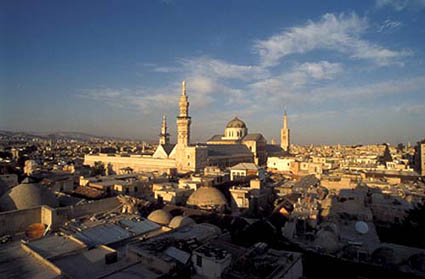
Culturally, Damascus was the religious capital of Islam, while a significant number of Eastern Orthodox Greeks inhabited Istanbul.
 Of course, this recent encroachment put them on the border of Poland as well as Russia. This meant that the Ottomans were trying to draw the Dutch into the war with these nations to assist them. As mentioned earlier, the Russians and Polish forces combined could overwhelm the Ottomans, and they could not at all rely on Sweden to draw the Russian forces away.
Of course, this recent encroachment put them on the border of Poland as well as Russia. This meant that the Ottomans were trying to draw the Dutch into the war with these nations to assist them. As mentioned earlier, the Russians and Polish forces combined could overwhelm the Ottomans, and they could not at all rely on Sweden to draw the Russian forces away. Strategically, after the pullback of forces from the West coast, the Dutch could have pushed their way through Poland, so long as the Ottomans were covering their southern flank, but this would leave the Dutch overextended, and give the Ottomans a strong drive through the undefended lands in Germany which would open up as Dutch forces pass into Poland and Russia. An alliance was a strong sign of trust and solidarity, but it was not impossible for an ally to betray an ally, and this consideration did have to come into Dutch military doctrine.
Strategically, after the pullback of forces from the West coast, the Dutch could have pushed their way through Poland, so long as the Ottomans were covering their southern flank, but this would leave the Dutch overextended, and give the Ottomans a strong drive through the undefended lands in Germany which would open up as Dutch forces pass into Poland and Russia. An alliance was a strong sign of trust and solidarity, but it was not impossible for an ally to betray an ally, and this consideration did have to come into Dutch military doctrine.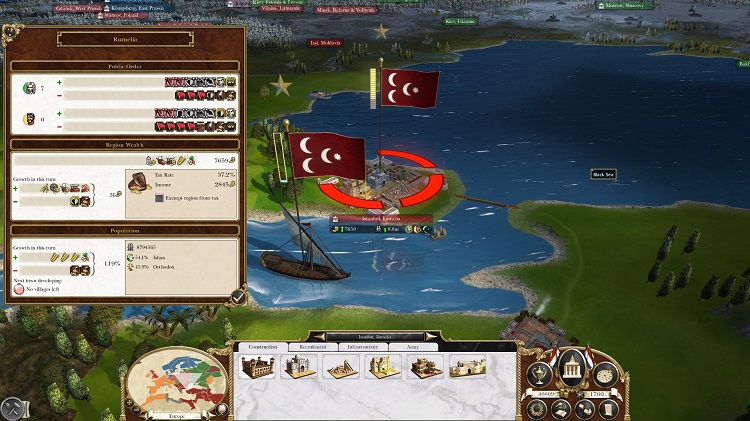
In the event of a war, Istanbul was to be considered the city of the greatest strategic importance, as it was what prevented all Russian trade abroad.
 This meant the Dutch needed to protect themselves against certain eventualities. The Dutch had negotiated that they would defend their allies along Poland until the war was resolved by blocking them at Hungary, a move that would require the annexation of Hungary, but would cut off the main invasion route for the Polish to attack the Ottomans, and allow the Ottomans any land acquired in the war.
This meant the Dutch needed to protect themselves against certain eventualities. The Dutch had negotiated that they would defend their allies along Poland until the war was resolved by blocking them at Hungary, a move that would require the annexation of Hungary, but would cut off the main invasion route for the Polish to attack the Ottomans, and allow the Ottomans any land acquired in the war.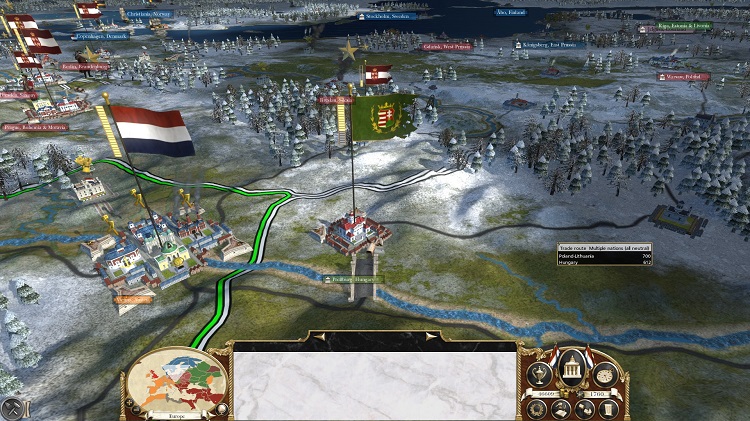
Hungary was not officially recognized by all states, which left it vulnerable. If Dutch controlled Austria declared them a rebel state, the Dutch could use that as means to start a just war.
 They also made sure to ratify the structure of the Federation government further, forming it into a separate institution which the Ottomans would be both independent of, meaning rulings from the council could not direct the actions of the Ottomans, but at the same time, the Ottomans could not force action from the council.
They also made sure to ratify the structure of the Federation government further, forming it into a separate institution which the Ottomans would be both independent of, meaning rulings from the council could not direct the actions of the Ottomans, but at the same time, the Ottomans could not force action from the council. In other words, the Western Atlantic Federation had for the time, not granted the Ottoman Empire admission into the Federation. They would agree to an alliance only, to be ratified for full membership once the Ottoman Empire was at peace with Russia, Poland and Hungary. At that point, it would not longer be up to the Ottomans whether or not war was declared on Poland or Russia. This did not guarantee the Polish or Russians wouldn’t attack, at which case the Dutch could be obligated to help the Ottomans, but at the very least it prevented the Ottomans from using the Western Atlantic Federation as a weapon.
In other words, the Western Atlantic Federation had for the time, not granted the Ottoman Empire admission into the Federation. They would agree to an alliance only, to be ratified for full membership once the Ottoman Empire was at peace with Russia, Poland and Hungary. At that point, it would not longer be up to the Ottomans whether or not war was declared on Poland or Russia. This did not guarantee the Polish or Russians wouldn’t attack, at which case the Dutch could be obligated to help the Ottomans, but at the very least it prevented the Ottomans from using the Western Atlantic Federation as a weapon. The alliance was declared with much celebration in June of 1760. The paperwork was signed, with much irony in Rome, mostly as the Dutch government’s way of snubbing the Pope. This was their way of stating on unequivocal terms that there would be no crusade.
The alliance was declared with much celebration in June of 1760. The paperwork was signed, with much irony in Rome, mostly as the Dutch government’s way of snubbing the Pope. This was their way of stating on unequivocal terms that there would be no crusade. 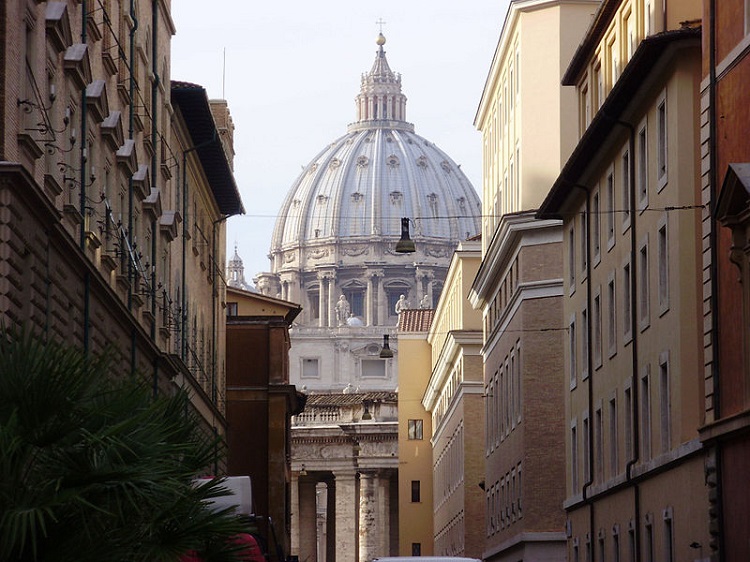
The treaty was signed in St. Peter's basilica, a carefully chosen insult against the Pope.
 This alliance was one of the most significant in history. With the vast majority of the Western Atlantic Federation internally supportive of the Federation, and with an alliance to the second most powerful nation in the world, the Dutch and Ottomans could easily sweep aside every other European power. This terrified the British, who were still contemplating what would be needed to restore their former glory, and the Swedes, who had been watching and biding their time were put on the back heel. Poland was outraged by the alliance more than anything, viewing the alliance as an affront to Christianity. Ironic, as in 1760 they had virtually defeated Prussia, who were formerly the Christian crusaders who had attacked the Polish for heresy. If anyone was likely to commit to war over this, it was the Polish.
This alliance was one of the most significant in history. With the vast majority of the Western Atlantic Federation internally supportive of the Federation, and with an alliance to the second most powerful nation in the world, the Dutch and Ottomans could easily sweep aside every other European power. This terrified the British, who were still contemplating what would be needed to restore their former glory, and the Swedes, who had been watching and biding their time were put on the back heel. Poland was outraged by the alliance more than anything, viewing the alliance as an affront to Christianity. Ironic, as in 1760 they had virtually defeated Prussia, who were formerly the Christian crusaders who had attacked the Polish for heresy. If anyone was likely to commit to war over this, it was the Polish.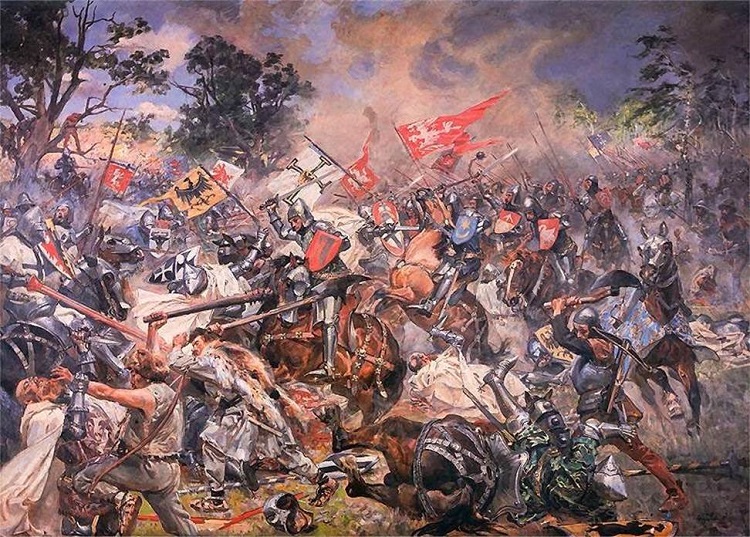
The Prussians were once the order of the Teutonic Knights, formed as monastic warriors in the crusader states, they declared a crusade against pagan Poland in their past.[/i]
 This move was a controversial one, and the Republican party was fairly certain it would hurt their chances at the next election. Their popularity had rebounded somewhat as they had done what few politicians had ever done, in that the past two years had involved massive government spending on public works, the economy and funding entrepreneurs.
This move was a controversial one, and the Republican party was fairly certain it would hurt their chances at the next election. Their popularity had rebounded somewhat as they had done what few politicians had ever done, in that the past two years had involved massive government spending on public works, the economy and funding entrepreneurs. The silver lining was that the Ottomans of the 1700s had one of the world’s most diverse and beautiful cultural centres in the world. With greater access to Ottoman markets, and an essentially free border to cross into their territories, exotic trade from the Ottomans, such as rugs, works of art, statues and so forth were bought in great quantities, whereas before, the Dutch had primarily bought coffee and steel. New markets opened up as industry passed through the Dutch Ottoman border with far fewer tariffs leading to tremendous prosperity for the Dutch factory workers.
The silver lining was that the Ottomans of the 1700s had one of the world’s most diverse and beautiful cultural centres in the world. With greater access to Ottoman markets, and an essentially free border to cross into their territories, exotic trade from the Ottomans, such as rugs, works of art, statues and so forth were bought in great quantities, whereas before, the Dutch had primarily bought coffee and steel. New markets opened up as industry passed through the Dutch Ottoman border with far fewer tariffs leading to tremendous prosperity for the Dutch factory workers.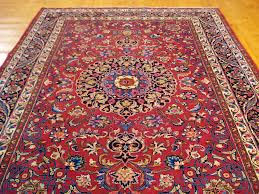
Persian rugs were of particularly high demand, but few Europeans could tell the difference between a Persian and Ottoman made rug. The independent Persian states still charged higher tarrifs to European traders, and so discerning appraisers who could tell the difference were indispensable to the discerning noble.
 The alliance between the Western Atlantic Federation and the Ottomans was the single most significant treaty of the 1700s. At no point in history was a single coalition granted as much power as them. While the Dutch had reverted from the conquering rulers of the war time to foster their industry, and the Ottomans had gone nearly two hundred years without appreciably turning to conquest, their combined might was for once realistically enough to take over the entire world. All it would take, was an act to rouse them, and for all plan in war to go as foreseen.
The alliance between the Western Atlantic Federation and the Ottomans was the single most significant treaty of the 1700s. At no point in history was a single coalition granted as much power as them. While the Dutch had reverted from the conquering rulers of the war time to foster their industry, and the Ottomans had gone nearly two hundred years without appreciably turning to conquest, their combined might was for once realistically enough to take over the entire world. All it would take, was an act to rouse them, and for all plan in war to go as foreseen.Next we will be presenting world news followed by a discussion of soviet history. If you want news of the current war in the Middle East please channel in to BBC radio 1. David Stephenson will be presenting more on the 80 years war in 3 days.